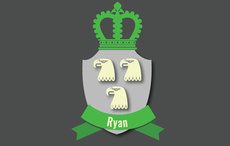It’s 8 a.m. and Fionnula Flanagan arrives for breakfast looking fresh as a daisy in a crisp white shirt. Her thick white hair swept back, not a lick of make-up. She looks beautiful; her once flame-red hair is now a luscious pearl. Antique earrings she picked up for 10 cents at a yard sale adorn her ears.
Molly Bloom is aging gracefully, but she still has the spit and fire of the sexy siren associated with James Joyce’s Women – the one-woman show that became the 1985 movie in which she plays various women who influenced Joyce’s life and writings.
One of the few Irish actresses to make it in Hollywood, Flanagan had been up until 3 a.m. celebrating Bloomsday, the day in the life of Leopold Bloom that is chronicled in Ulysses. The readings by a number of actors began at 7 p.m. in Manhattan’s Symphony Space and ended in the wee hours with Flanagan delivering Molly Bloom’s famous soliloquy.
Joyce has been a major factor in Flanagan’s career. In addition to Joyce’s Women, she played Gerty MacDowell in Joseph Strick’s film of Ulysses (1973), and Molly Bloom in the Broadway production Ulysses in Nighttown in 1974. So if she’s not on a movie set, or filming the latest episode of the Showtime hit Brotherhood in Rhode Island, Flanagan flies in to New York to take part in the annual Bloomsday readings.
Flanagan grew up familiar with Joyce’s Dublin in a family that treasured the Irish language, literature and culture. The eldest of five, she trained at the Abbey Theatre and struck out for New York, making her Broadway debut in Brian Friel’s Lovers in 1968. A national tour with the play brought her to Baltimore where she met Garrett O’Connor, a Dublin doctor working at Johns Hopkins Hospital.
When the tour ended, Flanagan decided to stay in America. She married Garrett, now C.E.O. of the Betty Ford Institute, settled in Los Angeles and found early success in television, winning an Emmy for the 1976 mini-series Rich Man, Poor Man, but had a hard time breaking into film. So she wrote her own script, turning her one-woman show on Joyce’s women into a movie.
Many fine films followed, including Waking Ned Devine (“working on an independent movie, on the Isle of Man for little money – who knew it would become such a success?”); Transamerica (“an important film”); Divine Secrets of the Ya-Ya Sisterhood (“every woman in America has read the book but not one man”); and one that affected her life profoundly – Some Mother’s Son, the 1996 movie about the Irish hunger strike, in which she starred opposite Helen Mirren, as the mother of a young hunger striker. Playing in this movie led her to consider more deeply the politics in the North of Ireland. When the IRA showed that they were serious about a ceasefire, she began to see Sinn Féin as the political way forward and reached out a helping hand, hosting a Hollywood welcome party for Gerry Adams.
A self-described political junky, who finds herself “glued to the set” as the upcoming American election rolls around, Flanagan is also passionate about the rights of immigrants, and lends her support to the Irish Lobby for Immigration Reform. She is also passionate about the Irish language and in 2007 she starred in the Irish language tv series Paddywhackery. (“I spent six weeks in the West of Ireland and it was so joyful to hear it spoken all around me.”) A relatively new passion is lending her support to turn one of Galway City’s historic buildings into an Art House Film venue, designed by the award-winning young Irish architect Tom De Paor and a project conceived and driven by Lelia Doolan, former Artistic Director of the Abbey Theater and first Chair of the Irish Film Board. (“Lelia is an amazing leader – knowledgeable, visionary, courageous, and, fortunately for The Galway Picture Palace, an unstoppable force of nature.”)
A few weeks after our meeting she received an Honorary Doctorate from the National University of Ireland, Galway. It is something that she is thrilled about. Then it was back home to Beverly Hills for a quick break before heading to Providence for Brotherhood’s season three shooting schedule where she plays Rose, matriarch of the Caffee clan. After that she’s off to Hawaii for another appearance on Lost.
One couldn’t ask for a more interesting breakfast companion. The following are some nuggets from our conversation.
The Husband
“When the tour finally got to Baltimore, we had been on the road 6 months and were all half crazed. Eamon Morissey, my fellow-actor said, ‘I have a friend in Baltimore who is a doctor.’ He brought him to the hotel and we met. I came upon them in the corridor as Garrett was on hands and knees telling a joke!
“So yes, we went on to get married. He had two children from a previous marriage, aged 11 and 12. So I actually married a group – then it really got crazy!”
The Drink
“What changed our lives was Garrett got sober and then I got sober. That was 25 years ago. That made a huge difference in so many ways, not just health-wise, but attitude-wise too. I don’t think I ever showed up drunk or stoned on the set, but I would show up angry and resentful, frightened and addled in interviews. Until I got clean I couldn’t take control of my life in a way that was either spiritually meaningful or healthy. I talk about it only because I think there are many women out there who are suffering similarly, ashamed to seek help. It doesn’t have to be that way.”
Betty Ford Institute
“Garret is the C.E.O of the Betty Ford institute, a new institute devoted to research and education about addiction. Everything he learned when he was Chief Psychiatrist at the Betty Ford Center, and in private practice and teaching at UCLA, the years of treating alcoholics and drug addicts and their families is now being put into reaching out to other doctors, challenging the proliferation of prescription drugs and educating the public that treatment, and specifically 12-Step treatment, works. He has not gone and lectured in Ireland yet, though I think he should.”
Immigration
“After the tour of Lovers I wanted to stay here. It was 1969. I was working in a theater company in Chicago, but my green card hadn’t come through and when they found out I was an illegal alien they suspended me. I couldn’t go home to Ireland, because if I left the U.S. I wouldn’t be allowed back in, since I had applied here. That was a scary time, not knowing if I would get a job or if my card would come through. I felt very vulnerable, and I can only imagine what it must feel like for people with children. For many of the Latinos on the West Coast, their lives are completely wretched. If they or their children get sick, they are afraid to go to the doctor, afraid to go to school, afraid to go to work, afraid they’ll be picked up and deported.”
The Big Break
“When I first came to Hollywood, I could not break into movies. I was fed up with the limitation of episodic television and that was when I sat down and researched Joyce’s Women. It was a journey. I told myself that I didn’t care if it didn’t work or if I went broke. It was a hard row to hoe, since I was so unknown. I was lucky to have Burgess Meredith, the absolute sublime master of staging Joyce. He became my mentor and my director and that was wonderful. James Joyce’s Women gave me legitimacy, caused me to be taken seriously. It got my phone calls returned!”
Irish Women in Hollywood
“The image of Ireland is projected as a male image in the acting world, similar to the way that the word of Ireland is male dominated. You’ll notice, as with the calendar of Famous Irish Writers, it is men who claim that domain, it is men who keep the performance; the reader, writer, and teller of the story is primarily male dominated and kept male dominated. Probably one of the reasons people don’t mention Edna O’Brien in the same breath as Joyce, O’Casey, and Shaw, when of course she should be mentioned in the same breath! It will take time, and it is changing slowly. Part of it, I believe, is training women to take ownership of their talent.”
Favorite Place in Ireland
“Many. I do love Connemara and the West – Donegal and Mayo – there is something magical and sacred about that mountain [Crough Patrick]. I think there is a reason, probably pre-Christian, why that became a sacred place.”
Life Is Good
“Thank God, life is good. I’m working. I’m developing a script with a writer, not Irish, totally Americana.
“I’m a great-grandmother! My two stepsons each have daughters, and the eldest who is 23, has just had a baby. They’re all healthy and that’s what matters.”




Comments